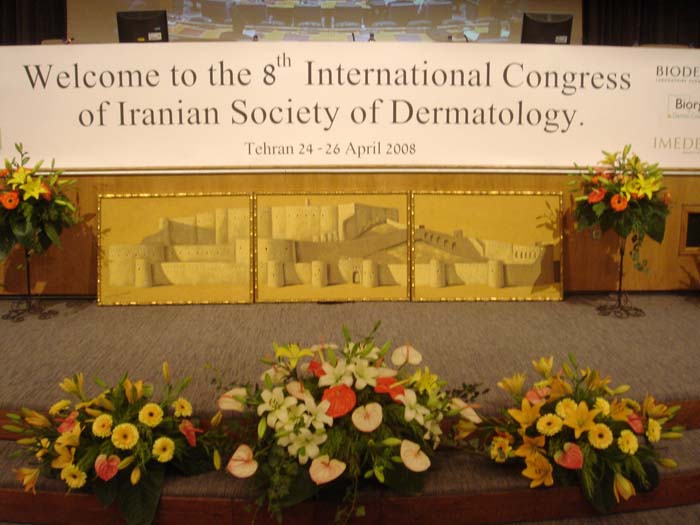IRANDERMA |
|
Letters, Photos... |
During the past several weeks,
we attended two International meetings; The 8th International
Congress of Iranian Society of Dermatology and the 5th EADV
spring Symposium. Again, the most valuable gaining was meeting
friends and finding new ones!

Vth World Congress of the IACD- December 9-13, 2006- Melbourne, Australia
1st world congress of teledermatology- November 9-11, 2006 - Graz,
Austria
The first world congress of teledermatology was another opportunity for me to be in Graz again with my very nice friends from the department of dermatology at LKH.
Opening ceremony was held in the opera house, where my brother-in-law and his friend enriched the party with the sounds of their violins; an unforgettable night.
Photos of the congress are available through this link:
http://www.teledermatology-society.org/worldcongress/photos_OfficialTeledermatologyPhotos/index.html
Omid Zargari, November 2006
15th EADV congress- Rhodes 13-October Omid Zargari
When I was a medical student, among all
of those heavy text books which we had to read, there was an
illustrated hand book of physiology that I liked very much; it was
written by a Greek physiologist who was lost during one of his
journeys between islands in Greek. This was why I booked for an air
flight from Athens to Rhodes since weeks earlier!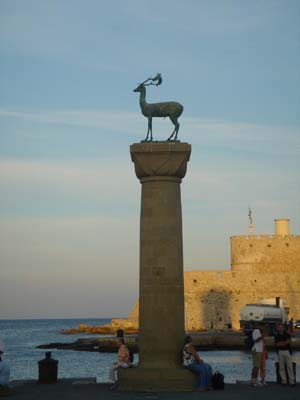
“Mythos” was the name for the dance theater show of the opening ceremony. It began with the birth of the great Goddess mother and ended with a festive dance at the forest of Aphrodite. I liked the dance, but the voice of violin was a little bit super modern for my ears and I guess many of the audiences preferred to hear some “fiddler on the roof” type music.
The ancient city of Rhodes is one of the world heritage cities and as like as many other things in the world its name doesn’t come from what you think at first (roses), but simply originated from something else (snake in this case) and as like as all of the other Greek things, it has some links to myths. Just to mention it has some relations with sun and Helios, the sun-god and…
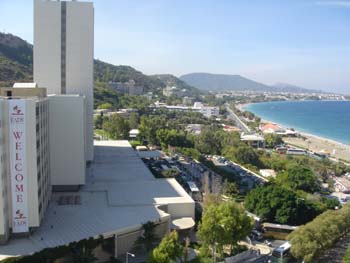 I met colleagues from Romania, Egypt,
Taiwan, Tunisia, Turkey, Syria and the US and almost with all of
them the final point of discussions was about nuclear energy!
I met colleagues from Romania, Egypt,
Taiwan, Tunisia, Turkey, Syria and the US and almost with all of
them the final point of discussions was about nuclear energy!
The Athens airport was the first airport in which I found a museum and of course I didn’t surprise, but I could become surprised if there were no American flags (Mc Do) in the airport… and I didn’t again!
Omid Zargari, September 2006
14th EADV congress- London 2005 Omid Zargari
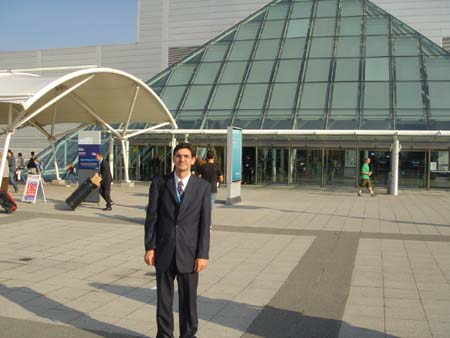
13th EADV congress- Florence 2004 Omid Zargari
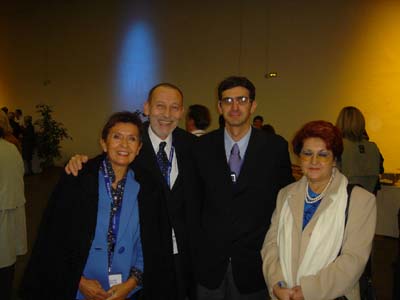
On June 18, the Society of
Guilanian Dermatologists with the helps of parshayan company
organized a wonderfull picnic meeting in the beautiful nature of
historical village of masooleh. This
was the 2nd spring meeting and nearly all of the Guilanian dermatologists participated with their families in this
picnic and enjoyed the fresh air and green ground of the country.
Guilanian dermatologists participated with their families in this
picnic and enjoyed the fresh air and green ground of the country.
Dear
friends

A
devastating earthquake occurred in the ancient Silk
Road city of Bam in southeastern Iran about 5:30 AM on Friday. Thousands
killed in this earthquake and more than 70% of the city destroyed.
The quake also destroyed much of the Bam’s ancient citadel
(Arq-e-Bam), one of Iran's
best-loved tourist magnets
that date back 2000 years.
We condole all of the survivors of this disaster.

I
would like
to express
my deepest
condolences to
all Iranians.
Asking Almighty
God to
help them
and provide
them patience
& security. Our
heart with
our brothers
in Iran.
Dr Fadi M M Hajjaj
.. I read about the
Earthquake this morning in the New York Times. These events
show how puny man is. The power of nature is so much more
powerful than the military juggernauts of our
"super-powers."
All of our prayers go to the people of Bam - their sense of loss must
be intense. ...
There are lessons to be learned. We keep having to learn these
over and over again. How important peace and security is.
A town stood for 2000 years, and within a few moments it can be
changed forever. Something like this is always around the
corner.
Sincerely,
David Elpern
...We feel deepest sorrow for the victims of the earthquake. All Egyptians share their brothers in Iran their feelings.
Emad El-Gamal
Alexandria,EGYPT
I express deep sorrow & shock in this earthquake. May Allah give them heaven who are departed & give them enough consolation who are alive .
Dr. Nurul Amin
Bangladesh
Iranian writer Shirin
Ebadi won Nobel Peace Prize

Iranian
writer and lawyer Shirin Ebadi, a
female human rights and democracy activist has won the 2003 Nobel
Peace Prize for her focus on human rights, especially on the
struggle for the rights of women and children.
"As
a lawyer, judge, lecturer, writer and activist, she has spoken out
clearly and strongly in her country, Iran, far beyond its borders,''
the Norwegian Nobel Committee said in its citation. It said she has
stood up as a "sound professional, a courageous person, and has
never heeded the threat to her own safety.''
"I
am very happy, and hope that the prize can contribute to the
struggle for human rights in Iran," Ebadi
said in a telephone interview with Norwegian Broadcasting (NRK)
after the announcement. Ebadi also
said that she hoped the prize would encourage other Muslim woman
around the world, and for their fight for equal rights.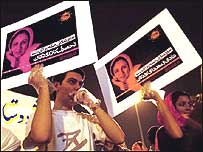
Shirin
Ebadi
is known for representing the interests of persecuted individuals
and has braved reprisals for her beliefs. She is one
of the first female judges in Iran and received her law degree from
the University of Tehran.
We
congratulate Shirin Ebadi and all Iranians for Noble Peace Prize
winning!
August 23 is the Physician’s day in Iran in memory of Iranian famous physician Ibn- Sina
IBN SINA 980-1037
Iranian physician, philosopher, mathematician and astronomer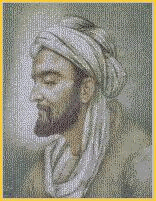
Abu Ali al-Hussain Ibn Abdallah Ibn Sina (Avicenna) was born in 980 A.D. at Afshaneh near Bukhara. The young Bu Ali received his early education in Bukhara, and by the age of ten had become well versed in the study of the Qur'an and various sciences. While still young, he attained such a degree of expertise in medicine that his renown spread far and wide. At the age of 17, he was fortunate in curing Nooh Ibn Mansoor, the King of Bukhhara, of an illness in which all the well-known physicians had given up hope. On his recovery, the King wished to reward him, but the young physician only desired permission to use his uniquely stocked library.
By 21, he was also given an administrative post and soon wrote his first book. Avicenna was now an established physician and political administrator, professions he continued to practice in the courts of various Iranian rulers, heads of the numerous successor states of Iran that emerged during the disintegration of the Abbasid authority.
On his father's death, Bu Ali left Bukhara and travelled to Jurjan where Khawarizm Shah welcomed him. There, he met his famous contemporary Abu-Raihan Biruni.
Later he moved to Ray and then to Hamadan, where he wrote his famous book Al-Qanun fi al-Tibb (The Canon of Medicine). Here he treated Shams al-Daulah, the King of Hamadan, for severe colic.
From Hamadan, he moved to Isfahan, where he completed many of his monumental writings. Nevertheless, he continued travelling and the excessive mental exertion as well as political turmoil spoilt his health. Finally, he returned to Hamadan where he died in 1037 A.D.
Avicenna wrote 99 books, almost all in Arabic, the language of religious and scientific expression in the entire Muslim world at that time. However, two of his works, the `Daneshnameh-e-Alai' (Encylopedia of philosophical sciences) and a small treatise on the pulse, were written in Farsi, his native language. He wrote about natural philosophy and astronomy, theology and metaphysics, medicine, psychology, music, mathematics and physical sciences and he is also the reported author of Persian quatrains and short poems:
"Up from Earth's Centre through the Seventh Gate I rose, and on the Throne of Saturn sate, And many a knot unravelled by the Road, But not the Master-knot of Human Fate."
LECTURE
NOTES
"On
Tolerance, Intolerance, and Islam"
By Ali Asani, Ph.D.
Professor,
Harvard University
May
6, 2003
The speaker was a very pleasant,
low-key individual, he spoke slowly and clearly. For an evening
lecture, this was not electrifying and I, for one, had difficulty
keeping focused and keeping my eyes open. This is not a criticism of the
speaker, but just how my mind works towards around 8:00 p.m. in the
evening after a long day at work.
"Why do they hate us?"
Americans ask that about Muslims.
Muslims ask that about Americans.
Both groups have stereotypes about "the others." Americans see Muslims as terrorists, as fundamentalists, as Arabs. Indeed, of the over one billion Muslims on this planet, only about 20% of them are Arabs (I have to check this number).
The Muslims have certain stereotypes about Americans. They look on us as the new imperialists, they get a lot of their information about America from TV programs, soap operas and situation comedies. They think we are all promiscuous and rich.
Thus, both sides have stereotypes
about the other which tend to dehumanize the other group.
Dehumanization has dangerous consequences as most of the stereotypes are
based on ignorance. Professor Asani calls this "the conflict of
mutual ignorance."
Of course, one big topic is the image
of Islam as an intolerant religion. Reading of the Quran does not
shed light on Islam any more than reading of the New Testament tells us
about what Christianity is today. For instance, the Bible (New
Testament) has been used as a justification for slavery and the Ku Klux
Klan. Religious scriptures (Jewish, Christian, and Muslim) can be used
to legitimize political and economic goals.
The speaker felt that the Quran is a pluralistic text.
1. It recognizes Mohammed as a prophet.
2. It recognizes other paths to salvation such as the Judaic and the Christian.
But today, some fundamentalists often use it to justify Islam as a superior civilization and this is done to further political goals of certain groups. So Islam (from the Quran) is a pluralistic ethic. Chapter 34, line 84, is about tolerance. The word Muslim in Arabic translates into one who submits, rather than one who conquers. Muslims were previously called Ahl Al-Kitab: People of the Book. They are one of the religious groups who received revelation from scripture: similar to the Jews and the Christians. Mormons also have their own scripture or revelations.
Given that the Quran teaches
pluralism, how can such a pluralistic text be interpreted in such
exclusive ways? The rise of exclusionist Islam derives from
complex factors. Islam has become a religion of empire (in some
places) where Jihad is literally translated as a struggle and the
original concept was that mankind is a Jihad, but this does not mean
conquering others, it means conquering one's self.
The traditional track of Muslims is that of pluralism, according to the speaker, and this is now under attack.
09/11 saw the rise of Islamophobia. The FBI now profiles every Muslim mosque. Some Muslims are afraid to pray. Some have even changed their names. Canadian Muslims feel that the civil rights of Muslims in the United States are being violated. Pluralism in the United States has been damaged and changed after 09/11. In the United States, many Muslims feel they are in a "virtual internment." Hate-filled remarks directed towards Muslims are common in the States now. They are seen as "protozoa who multiply everywhere." People have suggested that Mecca should be nuked. The Quran has been compared with Hitler's Mein Kampf. Islam has been compared to Nazism.
When Muslims from other countries look at the U.S., this reflects on our national religion (Christianity). It is well-known that the U.S. has one of the highest crime rates in the world. So, does this mean that Christianity promotes crime? We should not use the lens of religion to explain culture.
Professor Asani then spoke a bit about Sharia: an Arabic word for the path or the way. _____ has shown a new way where the path divides for man to follow. Post 09/11 we have learned how powerful the media is. They present only what fits the image they want to project. They tend to print what supports the stereotypes.
To be pluralistic, we need to accept all groups. For the Muslim community this has to be a time of personal outreach. Muslims have to speak to their fellow Americans, Britains, French, etc. to be understood.
There is much ignorance that divides people along religious lines when Muslims in New York, London, India do not have the same agenda as some Arabs from Iraq, Saudi Arabia, Syria.
It was clear that this lecture was just a beginning. It was unfortunate that I was so tired and slept through parts of it. One of the most interesting points was how the media has created our perception of Islam and of Muslims. Most of us equate Muslim with Arab and Arab with terrorist. The terrorists are no more representative of the Arabs or of other Muslims that the Ku Klux Klan is of White Christians in the United States.
The
Art is long but time is short
In a few weeks we as a family will make the Journey to Southampton , some 120 miles away. It is the begining of the University year and our eldest who is 18 is embarking on a career in Medicine at Southamton medical school. It doesn't matter if you are clever or not but the truth of the matter is that many clever and highly qualified boys and girls did not get in this year. Those who are serious will try again next year with their straight AAA grades or better. Southampton asked my son to get AAB grades in chemistry, biology and maths but on the day he obtained AAAA grades on those subjects plus a grade A in Art.
Students have four choices and rarely you get more than one offer.Some of my son's other choices didn't bother to reply to him and merely ignored his application.
Some thirty one years ago it was a bit easier and I as a foreign student only had to obtain BBB grades to get in to Liverpool Medical school. Certainly todays candidates are under more pressure and it is not uncommon to have to wait a year to get a place.
In those far away days we were poorer than todays students as money was scarse and arrived irregularly from Iran.Most of todays students have parental backing here and can borrow money with zero interest from the government.
So it is back to Anatomy and histology and I hope as he goes through his five or so years I will also learn a few things that I have long forgotten and polish up on my basic science.
As they say: ' the Art is long but time is short'
What worries me is that at the end of the day will he be still as badly treated as my generation of doctors. Will the world always be ruled by the self interest of a minority of Politicians, Lawyers, Managers and business men in our globalised society who will sacrifice us all for their own lust for power?
ايران درما |
